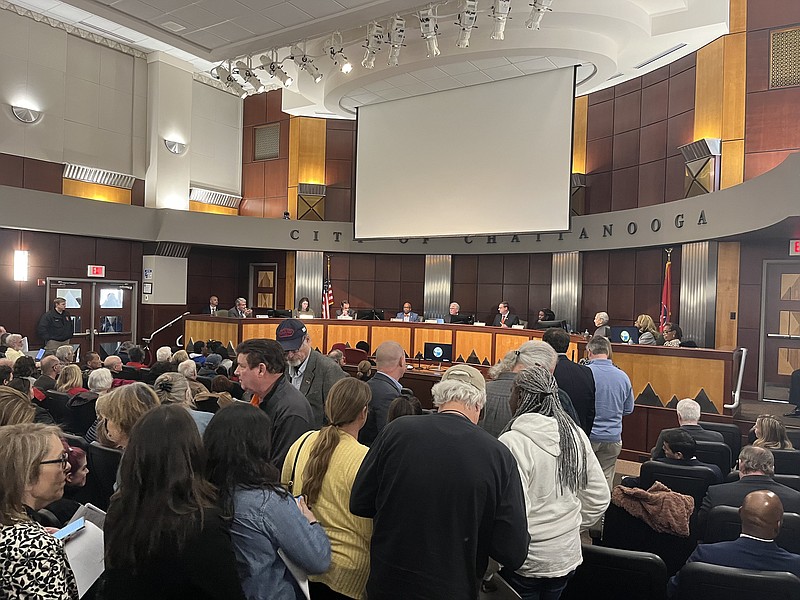Chattanooga Mayor Tim Kelly's Climate Action Plan -- a long-term strategy aimed at reducing the city's carbon footprint, promoting growth of green jobs and boosting alternative transportation options -- prompted 90 minutes of public comment Tuesday.
Dozens of people spoke during a public hearing in front of the Chattanooga City Council, which is set to vote on whether to adopt the policy during its regular meeting at 6 p.m. March 28.
The plan aims to make all city operations carbon neutral by 2040 and decarbonize the entire community by 2050. Kelly's office also hopes to ensure Chattanooga is a more sustainable city, that it is a leader in the green economy and that it takes steps to reduce social and economic disparities among vulnerable communities.
Representatives from EPB, the Tennessee Valley Authority and the Chattanooga Area Chamber of Commerce were among those expressing support.
"We recognize the need for affordable, reliable, resilient and clean energy," Carol Eimers, TVA regional vice president, told council members. "We also recognize that there's no one answer for achieving the nation's decarbonization goals, which is why we're committed to developing all potential pathways to a clean energy future."
Justin Groenert, the vice president of public policy at the chamber, also shared praise, stating that there's a lot in the plan that falls in line with the organization's economic development efforts.
Specifically, Tennessee and Chattanooga are poised to capitalize on the movement toward electric vehicles, he said, pointing to the progress made by existing companies like Novonix and Volkswagen.
"This is a real opportunity for Chattanooga to lead, and we think that preparing for these jobs and the green technology and energy sector are critically important," he said. "Chattanooga needs to be an example of that."
David Hoot, the chairman of the local chapter of the Sierra Club, said the plan contains a lot of good science, and he said the strategy demonstrates a focus on strengthening the community.
"This whole climate crisis kind of reminds me of the World War II effort," he told council members.
Hoot said his grandparents fought in World War II and faced up against fascism, which was the worldwide threat back then.
"They achieved it and defeated it. I think we have an opportunity to do the same with the climate crisis," he said.
Allie Beukema, a master of public health candidate at the University of Tennessee at Chattanooga, told council members national research shows Chattanooga is among the worst cities in America to grow up poor.
The healthiest community in the state -- Lookout Mountain -- sits just half a mile above the Alton Park neighborhood, which has the second worst health outcomes in the state, she said.
Beukema said closing the gaps in public health is one of the goals outlined in Kelly's One Chattanooga strategy, a framework aimed at closing socio-economic gaps in the city, and she said that priority should also be reflected in the city's climate action plan.
"The American Public Health Association ranks climate change as one of the greatest threats to health America has ever faced -- a true public health emergency," she said. "Prioritizing public health as a standalone goal provides the opportunity to consolidate existing health-related strategies as actions into one component that highlights climate's impact on community health."
Harriette Reid told council members that she recently moved to Chattanooga from California and argued that similar policies failed there.
"We have an unproven problem called climate change with an unproven solution called alternative energy that will supposedly decrease our carbon footprint," she said.
"We have utility companies that use maintenance budgets to put up windmills and solar panels instead of ensuring their infrastructure was safe and efficient," Reid continued, referring to California. "The result was forest fires where people lost their homes and businesses. The windmills are not only incredibly ugly, half of them don't actually turn. They're very effective at killing birds and not so great with keeping up with the energy needs of the state."
Other detractors also criticized the plan, claiming it was a gateway to globalism, increased surveillance and was part an effort to enslave people in a "digital concentration camp."
They also said that the decision should be up to voters and not members of the City Council. Opponents included several people who said they live outside the city but inside Hamilton County. One speaker said the problem wasn't climate but rather "increased electrification of the air."
"You want to clean up?" he added later. "Then stop spraying the skies."
Contact David Floyd at dfloyd@timesfreepress.com or 423-757-6249.
